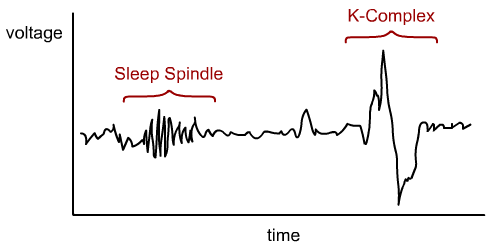No edit summary Tag: rollback |
No edit summary Tag: rte-wysiwyg |
||
| Line 2: | Line 2: | ||
[[Image:Stage2sleep.png|frame|right]] |
[[Image:Stage2sleep.png|frame|right]] |
||
| − | A '''K-complex''' |
+ | A '''K-complex''' that occurs during [[Sleep#Stages of sleep|stage 2 sleep]]. It consists of a brief high-voltage peak, usually greater than 100 HZ, and lasts for longer than 0.5 seconds. K-complexes occur randomly throughout stage 2 sleep. It is the response to echoic stimuli, but might also occur randomly during stage 2. Original research in the mid-1900s showed that K-complexes would arise when researchers would knock on the chamber of a sleeping subject. |
| ⚫ | |||
[[Category:Sleep]] |
[[Category:Sleep]] |
||
[[Category:Electroencephalography]] |
[[Category:Electroencephalography]] |
||
| ⚫ | |||
Revision as of 21:10, 25 March 2015
Assessment |
Biopsychology |
Comparative |
Cognitive |
Developmental |
Language |
Individual differences |
Personality |
Philosophy |
Social |
Methods |
Statistics |
Clinical |
Educational |
Industrial |
Professional items |
World psychology |
Cognitive Psychology: Attention · Decision making · Learning · Judgement · Memory · Motivation · Perception · Reasoning · Thinking - Cognitive processes Cognition - Outline Index

A K-complex that occurs during stage 2 sleep. It consists of a brief high-voltage peak, usually greater than 100 HZ, and lasts for longer than 0.5 seconds. K-complexes occur randomly throughout stage 2 sleep. It is the response to echoic stimuli, but might also occur randomly during stage 2. Original research in the mid-1900s showed that K-complexes would arise when researchers would knock on the chamber of a sleeping subject.
| This page uses Creative Commons Licensed content from Wikipedia (view authors). |